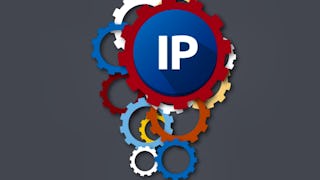Intellectual property (IP) law shapes the way we innovate, create, and share ideas in today’s world. From the brands we buy, to the technology we use, to the music and art we love, IP law sets the rules of protection and use—and those rules are constantly being tested and redefined.



Compétences que vous acquerrez
- Catégorie : Law, Regulation, and Compliance
- Catégorie : Technology Strategies
- Catégorie : Case Studies
- Catégorie : Creativity
- Catégorie : Intellectual Property
- Catégorie : Market Analysis
- Catégorie : Case Law
- Catégorie : Emerging Technologies
- Catégorie : Legal Research
- Catégorie : Music
Détails à connaître

Ajouter à votre profil LinkedIn
septembre 2025
1 devoir
Découvrez comment les employés des entreprises prestigieuses maîtrisent des compétences recherchées

Il y a 4 modules dans ce cours
In this opening module, you'll explore why intellectual property (IP) matters so deeply to innovation, creativity, and business success. You'll gain a foundational understanding of the U.S. IP system, why it exists, what it protects, and how it balances creators' rights with the public’s interest in expression and access. We’ll then turn to trademarks, the most intuitive IP tool for businesses. Through engaging Supreme Court cases involving scandalous trademarks, parodies, and political speech, we’ll investigate how trademark law collides—and coexists—with the First Amendment. From rock bands to dog toys to political jabs, you’ll see how modern debates test the edges of both trademark protection and free speech in unexpected and entertaining ways.
Inclus
6 vidéos
This module explores one of the most high-stakes and complex arenas in intellectual property today: standard essential patents (SEPs). We’ll begin with an overview of U.S. patent law and the unique licensing obligations SEP owners take on when their technology becomes part of an industry standard. Then we’ll dive deep into the landmark dispute between Microsoft and Motorola, a case that fundamentally reshaped how both courts and companies approach global patent licensing. Along the way, we’ll examine hotly debated topics like fair, reasonable, and non-discriminatory (FRAND) terms, injunctions, and international rate-setting. With digital technologies growing more interconnected every day, this case study serves as a powerful lens through which to understand the legal, economic, and geopolitical pressures shaping innovation today.
Inclus
5 vidéos
In this module, we explore how copyright law protects creative expression and how the boundaries of that protection are tested by artists, technologists, and courts alike. You will learn how copyright applies to music, including the dual rights in compositions and sound recordings, and why high-profile disputes involving Taylor Swift, Rick Astley, Pharrell Williams, and Ed Sheeran have captured public attention and sparked legal debate. We will examine how fair use functions as a defense to infringement, with a focus on landmark music and visual art cases, including the Supreme Court's ruling in Warhol v. Goldsmith. Finally, we will consider how copyright is evolving in response to new technologies like AI, and how these tensions reflect the broader challenge of balancing artistic protection with the freedom to build upon the past.
Inclus
4 vidéos
In this final module, we turn to trade secrets, the often overlooked but increasingly essential tool in the intellectual property toolkit. You will learn how trade secrets protect valuable commercial information, from proprietary algorithms to customer data, and how the law has evolved to recognize and enforce those protections. Through the story of a high-profile theft involving Google and Uber, we will examine how misappropriation occurs and what companies can do to prevent it. We will then explore the role of contracts, especially noncompete agreements, in trade secret protection and the ongoing legal battle surrounding their enforceability. As regulatory and technological landscapes shift, this module will help you understand how companies can safeguard confidential information while respecting individual rights and fostering innovation.
Inclus
5 vidéos1 devoir
Instructeur

Offert par
En savoir plus sur Business Strategy
 Statut : Essai gratuit
Statut : Essai gratuitUniversity of Pennsylvania
 Statut : Prévisualisation
Statut : PrévisualisationEDHEC Business School
 Statut : Essai gratuit
Statut : Essai gratuitUniversity of Pennsylvania
 Statut : Essai gratuit
Statut : Essai gratuitUniversity of Maryland, College Park
Pour quelles raisons les étudiants sur Coursera nous choisissent-ils pour leur carrière ?





Ouvrez de nouvelles portes avec Coursera Plus
Accès illimité à 10,000+ cours de niveau international, projets pratiques et programmes de certification prêts à l'emploi - tous inclus dans votre abonnement.
Faites progresser votre carrière avec un diplôme en ligne
Obtenez un diplôme auprès d’universités de renommée mondiale - 100 % en ligne
Rejoignez plus de 3 400 entreprises mondiales qui ont choisi Coursera pour les affaires
Améliorez les compétences de vos employés pour exceller dans l’économie numérique
Foire Aux Questions
To access the course materials, assignments and to earn a Certificate, you will need to purchase the Certificate experience when you enroll in a course. You can try a Free Trial instead, or apply for Financial Aid. The course may offer 'Full Course, No Certificate' instead. This option lets you see all course materials, submit required assessments, and get a final grade. This also means that you will not be able to purchase a Certificate experience.
When you purchase a Certificate you get access to all course materials, including graded assignments. Upon completing the course, your electronic Certificate will be added to your Accomplishments page - from there, you can print your Certificate or add it to your LinkedIn profile.
You will be eligible for a full refund until two weeks after your payment date, or (for courses that have just launched) until two weeks after the first session of the course begins, whichever is later. You cannot receive a refund once you’ve earned a Course Certificate, even if you complete the course within the two-week refund period. See our full refund policy.
Plus de questions
Aide financière disponible,


